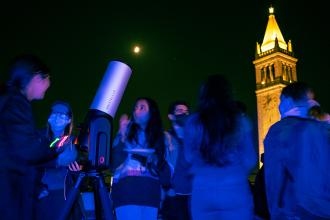“Truly lost.” That’s how Ivan Chavez says he felt when he arrived at UC Berkeley in fall 2018. The first-generation college student, who’d spent most of his life in Tijuana, Mexico, couldn’t find people he identified with, or a campus path to help him discover his academic passion — one involving history, politics, research and public service.
“I was unsure about my place in this school,” said the history major, now in his third year at Berkeley, “or what I could accomplish.”
Chavez tried political science classes; they weren’t the right fit. Then, aware of Chavez’s longtime interest in erased history — history kept from public knowledge due to prejudice — a friend and Berkeley alumnus suggested he apply to SURF, the Summer Undergraduate Research Fellowship for College of Letters and Science undergraduates.
Chavez was chosen, got a $5,000 stipend, a professor to supervise him, and embarked the summer before his sophomore year on researching the complex, untold histories of Golden Gate Park’s statues as part of his senior honors thesis. His work continues.
The SURF experience “changed my life,” said Chavez, “because it made me see the real perks of college,” including learning to properly document research and to navigate archives and data, to manage one’s time, to work closely with professors and to prepare presentations.
Not all undergraduates at Berkeley are so lucky. Many never find and develop an immersive project that’s intellectually captivating, brings a sense of educational purpose, generates feelings of community and belonging, and grows one’s confidence as a change-maker.
But a new campus-wide plan — the Berkeley Discovery Initiative — is beginning to transform that, for all Berkeley undergraduates. Being launched in phases, it aims to quickly draw students eager for a discovery experience into a rich ecosystem of campus resources and support.
“Discovery has been at the heart of UC Berkeley forever, and we have been in discussion for years about how to offer dynamic discovery experiences to all undergraduates. But now we have entered an exciting new phase,” said Erica Bree Rosenblum, professor of global change biology and the initiative’s faculty director. “We have launched a campus-wide initiative, with seed funding, staffing and creative vision for a future where every student will have a personalized and empowered discovery journey.”
The initiative, which grew from a series of campus conversations hosted by current Interim Executive Vice Chancellor and Provost Cathy Koshland and former EVCP Paul Alivisatos is a part of the Berkeley Strategic Plan that envisions discovery as “the foundation of the Berkeley experience and the heart of our campus identity.”
A major goal is to remove barriers for students who “tell us how lost they felt, and how unwelcome they felt, until they lucked upon a person who made a difference,” said Rosenblum. “The barriers can be particularly intense for underrepresented students, first-generation college students and transfer students, who don’t always have the free extra-curricular time and the financial means to invest deeply in discovery work.”
The Berkeley Discovery Initiative addresses these barriers holistically to create opportunities and access for all students, both inside and beyond the classroom. The Student Discovery Hub is becoming a new central campus resource, both in-person and online, that helps undergraduates plan discovery projects, plug into co-curricular programs and find mentors and collaborators.
One of the hub’s main activities this year is an advising project. Special advisers from departments, colleges, the Division of Equity and Inclusion, Student Affairs and other units are working to develop new best practices for inspiring and guiding students on their discovery journeys.
And the first Berkeley Discovery Departmental Innovation Grant Program awards have been given to six “trailblazing teams,” as Rosenblum calls them, that proposed multi-year plans to weave more engaged, inquiry-driven learning into the undergraduate experience. The winning teams are in astronomy, combined with physics; integrative biology; chemistry; electrical engineering and computer science; reading and composition, along with foreign language; and the combined schools of education, social welfare and public health.
The vast majority of a $5 million gift from Peter and Megan Chernin to support the initiative is being provided as multi-year support for these teams. “The idea is to deeply invest in projects that could really make an impact ‘at scale’ and with teams ready to commit to a multi-year, deep redesign process,” said Rosenblum.
Today, a personalized discovery project is encouraged for all undergraduates. Discovery-oriented programming is introduced to students at Golden Bear Orientation, and Cal Day 2022 will have discovery as its theme.
“It’s an ambitious initiative,” admitted Sean Burns, director of the Student Discovery Hub. “But I feel it is going to showcase the best of Berkeley, what really differentiates us from Stanford or San Francisco State, the scale of opportunities to really engage students in what we’re at the cutting edge of, not just our research enterprise, but the many facets of our institutional prowess.”
For years, Burns said he’s listened to students discuss how becoming passionate about a project while at Berkeley “became, essentially, their educational purpose. And their hands-on projects took many shapes — community engagement, entrepreneurship, the arts, research.”
By infusing discovery into Berkeley’s vast landscape through “embedding active learning and high-impact practices in the undergraduate experience, students will be more likely to pursue what they love and do so in a committed way, said Burns, “… whether it’s writing a play or creating a startup or doing historical research or working on housing issues in Oakland.”
